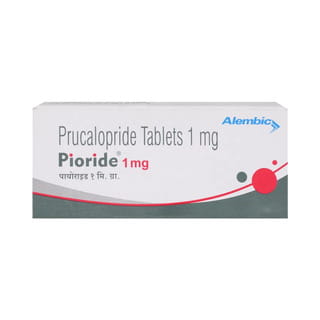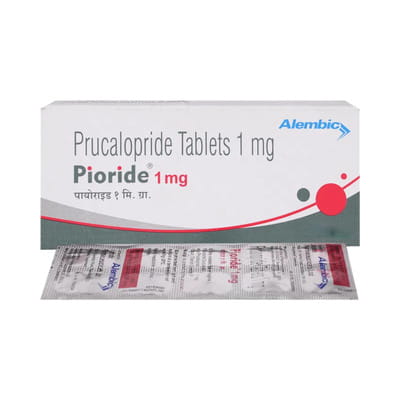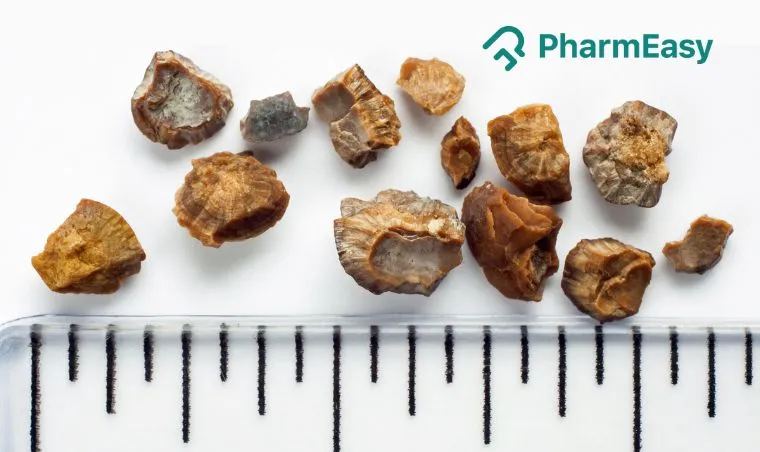Pioride 1mg Strip Of 10 Tablets
Description
Pioride Tablet is an anti-diabetic medication that is used to improve the control of blood sugar levels in adults with Type 2 diabetes. It is a combination of glimepiride and pioglitazone that work t
o reduce blood sugar levels and control Type 2 diabetes. Pioride Tablet is to be used only in adults older than 18 years. This medicine should be taken at the same time each day to get maximum benefits. Take this medicine in the exact dose and duration as recommended by our doctor. Do not stop taking this medicine on your own.
Product Summary
| Offer Price | ₹161.91 |
| You Save | ₹30.84 (16% on MRP) |
| Contains | Prucalopride(1.0 Mg) |
| Uses | Type 2 diabetes mellitus |
| Side effects | Increase in weight, swelling, dizziness, buildup of gas, loss of sensation on the skin |
| Therapy | ANTI-DIABETIC |
Uses
Contraindications
- If you are allergic to glimepiride, pioglitazone, or any other ingredient of Pioride Tablet.
- If you are allergic to other sulphonylureas or sulphonamides (glipizide, glyburide, sulfamethoxazole). If you are not sure what these medicines are, please confirm with your doctor.
- If you have or had heart failure, kidney disease, or liver disease.
- If you have or had bladder cancer or visible blood in the urine.
- If you have Type 1 diabetes mellitus where your pancreas produces little or no insulin.
- If you have very low blood sugar levels or a serious complication of diabetes called diabetic ketoacidosis.
- If you are pregnant or breastfeeding.
Side effects
- Increase in weight
- Swelling
- Dizziness
- Buildup of gas
- Loss of sensation on the skin
Precautions and Warnings
Pregnancy
Breast Feeding
Driving
Alcohol
Other General Warnings
- You have heart or liver problems.
- You are older than 75 years of age.
- You take medicines for treating inflammation.
- You have a type of diabetic eye disease called macular oedema which causes swelling of the back of the eye.
- You have cysts on your ovaries (polycystic ovary syndrome).
- You are already taking other medicines for the treatment of diabetes.
- You have problems with your enzyme called glucose-6-phosphodehydrogenase since it can decrease your red cells.
- You experience pain/burning while passing urine, sudden strong urges to pass urine, or notice blood in your urine.
- You experience difficulty breathing, an increase in weight, or swelling after using this medicine.
- You notice vision disturbances after using this medicine.
- You develop symptoms like tiredness, stomach ache, loss of appetite, nausea, vomiting and dark coloured urine after taking this medicine.
Mode of Action
How Does It Work?
- Pioride Tablet contains pioglitazone and glimepiride as its active substances.
- Pioglitazone allows the body to make better use of the insulin that it produces by making the fat, muscle, and liver cells more sensitive to insulin.
- Glimepiride stimulates the pancreas to produce more insulin.
- As a result, the level of blood sugar is reduced which helps to control Type 2 diabetes.
Directions for Use
- Take this medicine as a whole with sufficient water.
- Always take this medicine exactly as prescribed by your doctor.
- Do not consume more than the prescribed dose.
- Do not discontinue the medicine on your own without consulting your doctor.
Interactions
Interactions with other medicines
- Some medicines can affect the way Pioride Tablet works, or Pioride Tablet itself can reduce the effectiveness of other medicines taken at the same time.
- Tell your doctor about all medicines, supplements, or herbals you are currently taking or might take to avoid any possible interaction.
- The use of Pioride Tablet with medicines used to treat abnormal/high cholesterol levels (gemfibrozil), pain/fever (phenylbutazone), diabetes (insulin, metformin), tuberculosis (para aminosalicylic acid), tissue rebuilding (testosterone, stanozolol), bacterial infection (chloramphenicol, clarithromycin), fungal infections (miconazole), blood clots (warfarin), abnormal heart rhythm (disopyramide), obesity (fenfluramine), inflammation of the pancreas (fenofibrate), high blood pressure (ramipril, propranolol), depression (fluoxetine), gout (allopurinol), cancer (cyclophosphamide), Parkinson's disease (selegiline, phenelzine), poor blood circulation (pentoxifylline), allergies (tritoqualine) may cause an increase in the effect of Pioride Tablet in the body. ...
- The use of Pioride Tablet with medicines used to treat hormone imbalance (oestrogen, progesterone), fluid accumulation (hydrochlorothiazide), thyroid disorders (carbimazole), immune system alteration (cortisone), nausea/vomiting (thiethylperazine), mental disorders (chlorpromazine), increased eye pressure (acetazolamide), fits/seizures (phenobarbitone, phenytoin), constipation (bisacodyl), low blood sugar level (diazoxide), low vitamin B3 levels (nicotinic acid) may decrease the effect of Pioride Tablet in the body....
- Particular care should be taken if you are taking medicines for stomach/intestinal ulcers (ranitidine).
Storage and disposal
- Store in a cool and dry place away from direct sunlight.
- Keep it out of reach of children and pets.
Dosage
Overdose
Missed a Dose
Content Details
Dr. Arpit Verma
MBBS, MD, CCEBDM Diabetology
Dr. Ritu Budania
MBBS, MD (Pharmacology)
Frequently Asked Questions (FAQs)
Q: What is Type 2 diabetes mellitus?
Q: Can I stop taking Pioride Tablet when my blood sugar range goes back to normal?
References
Did you find this medicine information helpful?
Please rate your experience
Other Products from this Brand
Blog Articles
Chronic Condition Articles
Top-Tests we cover:
Top-Selling Healthcare Products:
Top-Selling Medicines:
Top-Searched Medicines:
Top Searched Vaccines:





















